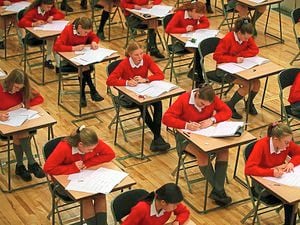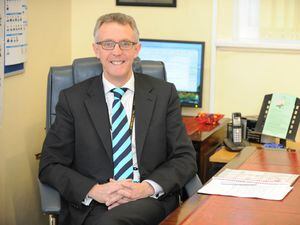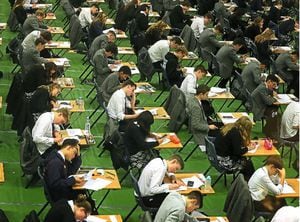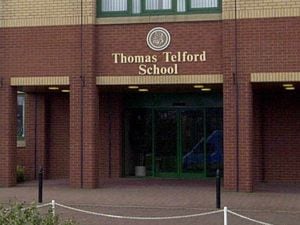Shock as third of Shropshire GCSE students fail to hit maths and English standard
More than a third of students in Shropshire face having to retake their maths and English GCSE exams, according to new figures.

It comes amid claims that average students are being failed by tougher tests they find impossible to complete.
GCSE exams in maths were so tough this year that, with grade boundaries being shifted, the pass rate for some exam boards was little more than 20 per cent.
Despite that shift, the failure rate for students achieving both maths and English in Telford & Wrekin was 41 per cent. In the Shropshire Council area it was 37 per cent.
Today one headteacher said the new exams, which are now graded from 1-9, only suit students who excel in the subjects.
Michael Barratt, executive principal at The Priory School Trust, which includes two secondary schools - The Priory School in Shrewsbury and St Martins in North Shropshire - said the specifications for GCSE courses now being taught were unhelpful to those who find the subjects more challenging.

He said: “The exams enable brighter students to experience stretch and challenge, which is great. But for those who find the subjects more challenging, the new specifications are disappointingly unsupportive. This is mainly due to the exam structure and the standard of reading required to interpret questions.”
Most of the exams are now graded on a 1-9 scale under the new system. A pass grade, previously a C, is now a 4, with the top score of 9 reflecting the need for a grade higher than the previous A*.
The Government has defined a grade 5 as a ‘strong pass’, which would fall between a B and a C in the old system.
Mr Barratt said it will be take time to be able to judge whether the new specifications will be of benefit.
He said: "The specification for both English and Maths is more challenging in terms of both the content and assessment.
Judge
"New exams always make for uncertainty and therefore there is significant difficulty in making accurate predictions. In turn this makes it difficult for students to take ownership of their target grades.
"Given we are only just past the second major sitting of the new exams, it will be some time before we are able to judge whether the new specifications will be of benefit."
A GCSE pass grade, previously a C. is now deemed to be a 4, although the government has concentrated on publishing figures for those who achieved a ‘strong’ grade 5 pass.
The Association of School and College Leaders, an education union, criticised that policy, saying it provided an “extremely confusing message for young people, their parents and employers”.
General secretary Geoff Barton said: “The result is that many young people will have felt deflated and uncertain despite having worked their hardest. They feel crushed, rather than proud.”
How did Shropshire pupils compare with the national picture?

GCSE students in Shropshire had overall attainment scores that were slightly better than the scores of other students in the West Midlands. Those in Telford were on the par with the region, but both areas and behind the national average.
Progress scores show that a typical GCSE student from the area did about as well as other pupils in England who started secondary school with similar results at Key Stage 2.
The Department for Education wants more 16-year-olds to take English Baccalaureate (EBacc) subjects - English Language, English Literature, Maths, History, Geography, modern languages and the sciences.
The proportion of students taking at least five EBacc subjects, and their average scores, now contribute to school league tables.
The Government wants to see 90 per cent of students taking the five ‘pillars’ of the EBacc- English, Maths, Science, History or Geography and a modern language - by 2025.
But across the whole of Shropshire less than half of the pupils opted for the EBacc.
'Delusional'
The National Education Union, which represents teachers, said that the Government’s 90 per cent target is “delusional” and should be abandoned, arguing that the EBacc restricts subject choice for young people.
Assistant general secretary Nansi Ellis said: “Since 2010 too many young people have been pushed onto inappropriate subject pathways and denied the opportunity to thrive in other valuable and challenging subjects.
“The EBacc policy is squeezing subjects such as Art, Music, Technology and Drama out of the curriculum, and must be stopped.”
Ms Ellis also said that the performance measures used by the DfE to create school league tables are “not an accurate or reliable indicator of school effectiveness”.
She said: “Schools and colleges are worth so much more than data alone can ever demonstrate.
“The DfE should stop using accountability measures in this flawed, damaging and inaccurate way.”
The DfE said that their reforms were ensuring rising standards, including more pupils taking the EBacc subjects that “best keep their options open”.
School Standards Minister Nick Gibb said: “This is a testament to the hard work of pupils and our teachers, who rose to the challenge of our reformed GCSEs and A-Levels this summer.
“These new qualifications will ensure pupils have the knowledge and skills they need for future success, and that every child is able to realise their full potential.”





